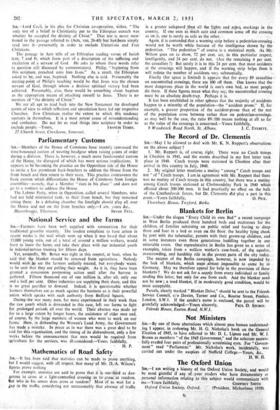SIR.—Lord Cecil, in his plea for Christian co-operation, writes, "The
only test of a belief in Christianity put to the Ethiopian eunuch was whether he accepted the divinity of Christ." That test is never men-' tioned in the passage referred to (Acts, vitt, 26-40) but hastbeen simply read into it—presumably in order to exclude Unitarians and Free Christians.
The passage in Acts tells of an Ethiopian reading verses of Isaiah (utt, 7 and 8), which form part of a description of the suffering and exaltation of a servant of God. He asks to whom These words refer (a question still discussed by commentators). Philip, "beginning from this scripture, preached unto him Jesus." As a result, the Ethiopian asked to be, and was, baptised. Nothing else is said. Presumably the starting-point of Philip's teaching would be that Jesus was the chosen servant of God, through whom a decisive spiritual victory had been achieved. Presumably, also, there would be something about baptism as the appropriate means of attaching oneself to Jesus. There is no mention of "the divinity of Christ."
We are all apt to read back into the New Testament the developed points of view to which reflection and speculation have led our respective Churches. Few Christians realise the extent to which this tendency operates in themselves. It is a most potent cause of misunderstanding and confusion. Do not let us read things into scripture in order to exclude people.—Yours, FRANCIS TERRY. 22 Church Street, Crewkerne, Somerset.


































 Previous page
Previous page